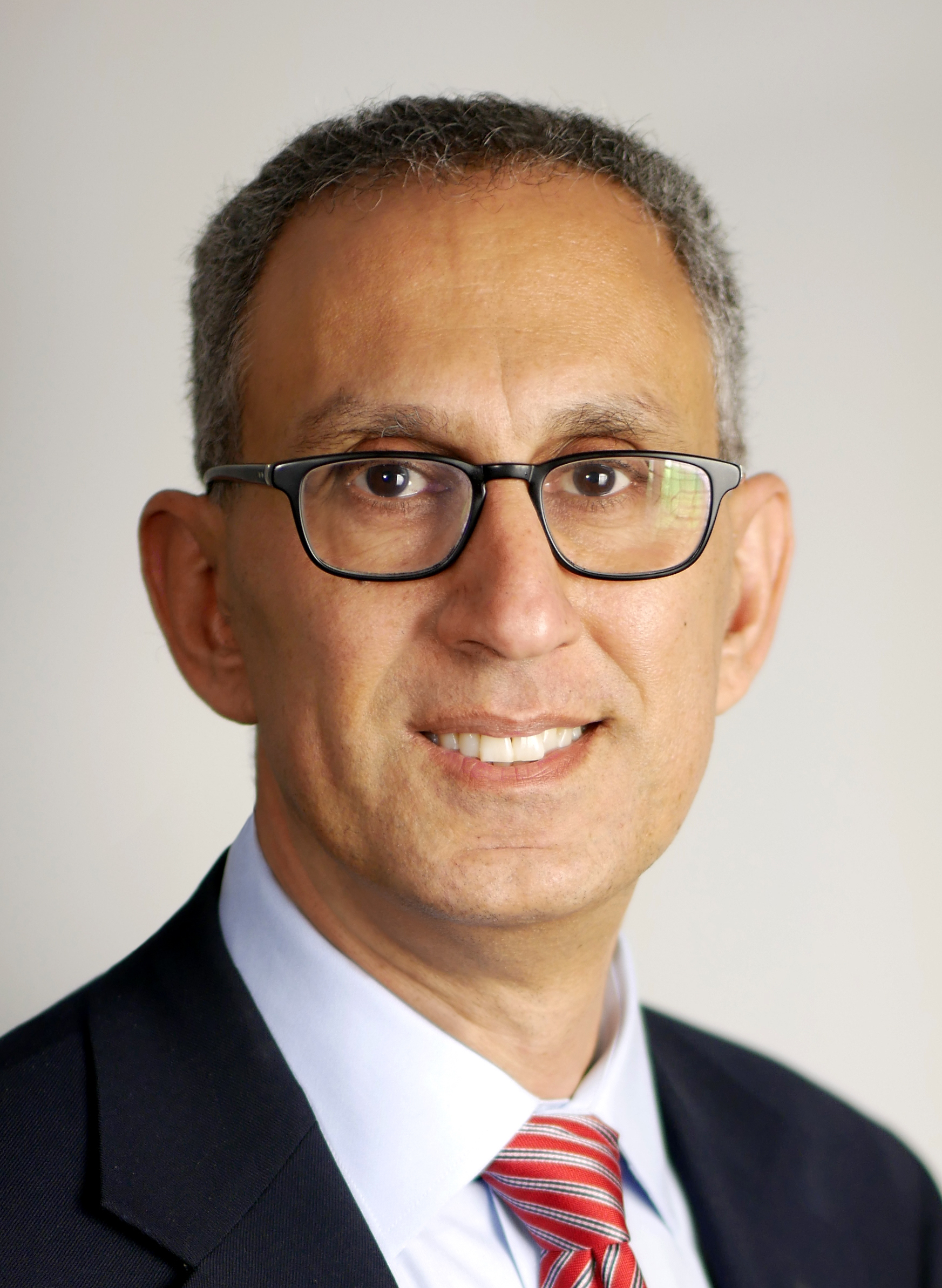Waleed Meleis
Vice Provost for Graduate Education, Office of the ProvostAssociate Professor, Electrical and Computer Engineering Department
Northeastern University
360 Huntington Avenue, Boston, MA 02115-5000
w.meleis@northeastern.edu
Education
PhD, University of Michigan, 1996MS, University of Michigan, 1992
BSE, Princeton, 1990
Research
Enabling Engineering.JPTE , JMIR
Volunteer Science: A Web-based Framework for Online Behavioral Experiments.
SunBelt14, SunBelt13
Function approximation for large-scale reinforcement learning.
AAMA10, IAT09, AAMAS09, AAMAS08
Scheduling of Bursty Workloads on Computing Grids.
IPCCC11, ICC11
Spectrum Management of Cognitive Radio Using Multi-agent Reinforcement Learning.
AAMA10, WWIC10, WIMESH10
Microprocessor-aware scheduling algorithms for modern compilers.
IJPP02, IPL01, JC01, Micro00, PACT00, SODA99, SODA99b, ICS94, SIPS98
Instruction scheduling using tight bounds.
TC01, Alg02, Micro99, IPL02, ICPP00,
Parallel and Scalable Processing Systems and Programming Toolsets.
PDCS09, SPIE04, WCL02
Applications of Combinatorial Optimization.
IPL, ARVLSI97, DT98, TC99, DFT02, FCCM, IPDSPS04
Parallel and Scalable Processing Systems and Programming Toolsets.
MWCL02, Sim02, ACES02, SPIE04
Student Group
Enabling Engineering is a College of Engineering student group that works to enable and empower individuals with disabilities. We work to build low-cost devices that improve the lives of the elderly and individuals with physical or cognitive disabilities, help family members and nursing care professionals care for people with special needs, and empower affected individuals by giving them greater independence, reducing medical errors, and increasing social connectedness, at minimal cost (Website, NU, NU, 2014 Annual Report).Press
2019: Intravenous Line Organizer (NU)2019: Touch This Page (NU)
2019: Enabling Engineering (NU)
2018: Enabling Engineering (NU)
2017: What's New Podcast (NU)
2017: Enabling Engineering (Duque)
2016: VR Rehabilitation (NU)
2015: Italy and the Scientific Revolutions (NU)
2015: Help Me Get There (NU)
2015: Touchscreen Guard (NU)
2015: Enabling Engineering interview (mp4, wmv)
2015: Enabling Engineering (COE)
2014: Enabling Engineering (NU, NU, InCompliance, SL)
2014: MAG: Memory Assistive Glasses (NU)
2014: EOG: Electrooculography Assistive Communication Device (NU)
2013: ICD: Interoperable Communication Device (NU)
2012: Board Games over IP (NU, HackADay)
2012: iCRAFT: Robotic Feeding Arm for the Disabled (NU, CNN, Engadget, Engadget, Forbes, PCWorld, Herald News)
2012: HyCycle: Sustainable Bike-powered Energy Source (NU, Engadget)
2011: Brain-Controlled Flight Control (NU, AVweb, ACM TechNews)
2011: DARWiN: Disability Assistant Robot With i (Eye) Navigation (NU)
2009: Electrostatic Computer Interface (HackADay)
Teaching
EECE 2540: Fundamentals of Engineering AlgorithmsEECE 2750: Enabling Engineering (NU)
EECE 4536: Advanced Engineering Algorithms
EECE 4790: Capstone Design 1
EECE 4792: Capstone Design 2
EECE 7205: Fundamentals of Computer Engineering
EECE 7360: Combinatorial Optimization
GE 1210: Scientific Revolutions Abroad (NU)
HONR 3310: Honors Seminar, Fundamental Limits on Scientific Knowledge: Chaos, Complexity, and Computability
Awards and honors
2019: Outstanding Faculty Service Award, COE2016: Fostering Engineering Innovation in Education Award, COE
2015: Black Engineering Student Society Professor Appreciation Award
2013: Favorite Professor selection by Senior Yearbook
2012: Invited to represent Northeastern at the National Academy of Engineering's Frontiers of Engineering Education Symposium
2012: Favorite Professor selection by Senior Yearbook
2011: Outstanding Teachers of the College of Engineering
2010: Eta Kappa Nu Professor of the Year Award
2008: Martin W. Essigmann Outstanding Teaching Award, COE
2004: Center for Innovative Course Design Teaching Award, EdTech
2003: Martin W. Essigmann Outstanding Teaching Award, COE
Funding
NSF EIA, Research Instrumentation Grant, 1998-2000NSF EIA, Major Research Instrumentation Grant, 1999-2000
NSF CCR, Research Grant, 1999-2001
NSF EIA, Major Research Instrumentation Grant, 2000-2001
NSF CCR, Research Experience for Undergraduates Supplement, 2000-2001
NSF CenSSIS, Research Grants, 2000-2010
Provost ENHANCE Grant, 2007
US Army Research Lab Network Science Collaborative Technology Alliance (NS-CTA), 2013-2014
Noonan Memorial Research Fund, 2016-2017
New York Community Trust Grant, 2015-2018
Lanes Family Grant, 2016
Provost Tier 1 Grant, 2018-2019
Students
Ph.D.Wei Li (2018): Function Approximation-based Reinforcement Learning for Large-Scale Problem Domains
Ceyhun Karbeyaz (2015): Optimized Participant Assignment for an Online Experimental Framework
Curtis Watson (2014): Signal Detection and Digital Modulation Classification-Based Spectrum Sensing for Cognitive Radio
Cheng Wu (2010): Novel Function Approximation Techniques for Large-scale Reinforcement Learning
Juemin Zhang (2010): Adaptive Grid Computing
Ivan Baev (2001): Resource Aware Instruction Scheduling
M.S.
Junxiang Chen (2013): Optimal Breast Cancer Screening Policies
Maryam Ashouei (2002): Optimizing Matlab: Improving the Performance of an Acousto-Photonic Imaging Application
Elias Mizan (2002): Performance Analysis and Machine-dependent Compiler Optimizations for the Intel Itanium Processor
Desheng Jiang (2001): Parallel Implementation of the Steepest Descent Fast Multipole Method (SDFMM) On a Beowulf Cluster System
Jason Goldstein (2001): An Architecture and Task Allocation Scheme for a Homogeneous Synchronous Data Flow System
B.S.
James Kirk (2010): Two-sided Matching and the National Residency Match Program
Scott Frasso (2009): Online Framework for Multiagent Simulations
Andrew Li (2008): Algorithm Design and Reinforcement Learning
Geoff Krapf (B.S. 2003): Building a Beowulf Cluster, and the Effect of Hardware and Software Variation on Benchmarking Results
Eric Anderson (B.S. 2003):
Ebubechukwu Okafor (B.S. 2003): Estimating the Difficulty of Solving Partitioning Problems
Adaeze Ibeneche (2002): Using Message Passing Interface (MPI) to Parallelize Scientific Applications
Ahmed Kanan (B.S. 2002): Evaluation of Compiler Algorithms for Explicitly Parallel Instruction Computers (EPIC)
